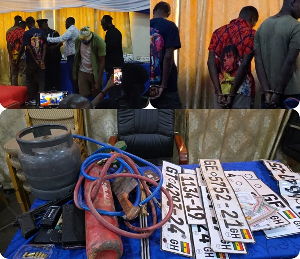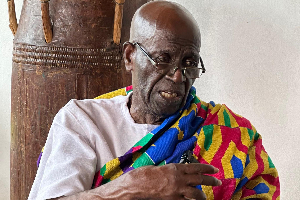……Are we taking steps to keep relevant records?
Asks Sammy Dzandu
The finding of oil in commercial quantities in our beloved country is indeed good news. It was reported few days ago that work had begun on the multi-billion dollar Jubilee Gas Project too to harness the country’s natural gas deposits with the laying of flow lines to pipe the gas from the Jubilee Field to the Jomoro District of the Western Region. Considering the benefits that could be derived from the oil and the gas, we have every cause to thank God for endowing us with such rich natural resources.
Seminars, conferences and workshops have been organized and are still being organized on how to manage the oil and the gas. These seminars and conferences are important because we need to protect the fields of the oil against any terrorist attacks or sabotage. Also, we need to put the necessary measures in place to protect the environment against any form of pollution. What is even more important is that the seminars and the workshops would enlighten us as to how to make judicious use of the oil revenue. This is very crucial because the finding of oil in some countries has brought chaos and curses instead of blessings due to the way the revenues were [mis]managed.
It is a fact that we need professionals including engineers, economists and businessmen to help us in the exploration, production; marketing and the sale of the products. But how many people know that archivists are also needed in promoting the industry? Discussing some issues about the oil find with a colleague last week, I made the point that we needed archivists in the oil industry. Interestingly, my colleague asked me what business archivists had to do with oil find. Well, whether he asked the question mockingly or out of ignorance, the fact remains that archivists could contribute immensely towards the progress of the industry. I believe, just like my colleague, there are many people up there who may not know the importance of archivists as far as national development is concerned. It would therefore be proper to enlighten such people on the role of archivists.
By the way, who is an archivist? An archivist primarily establishes and maintains both physical and intellectual control over records of enduring value. In fact, an archivist selects records, (the selection requires an understanding of the historical context in which the records were created, the uses for which the records were intended and the relationship of the records to other sources or stakeholders) arranges the records and describes the records in accordance with accepted standards and principles. He also preserves records properly for posterity. An archivist does not only publish and exhibit the collections he has but also assists researchers during their searches.
It should however be noted that one needs to be trained to be able to perform the above duties efficiently and effectively.
Archivists have some “relatives” and it is important to explain the type of relationship that exists between them since some people confuse them. A very close “cousin” of the archivist is the librarian. While both librarians and archivists collect, preserve and make materials accessible for research, the way they arrange, describe and use the materials are different. The fact, however, is that both are descendants of the same “great-grandfather” called “Mr. Information”. It is also important to make the distinction between archivists and museum curators. While a museum curator basically collects, studies and interprets objects, an archivist works with records. In fact, records in this case does not refer to only papers but any reproducible format on which information is captured for conducting business. Films, maps, technical drawings and photographs are therefore examples of records.
Archivists play very important roles in the society. Without them, it would be almost impossible to have access to archival materials, which are needed in almost every sphere of life. For instance, medical researchers use archives to study the patterns of diseases. Historians and genealogists rely on archival sources to analyze past events to reconstruct family histories. Authors also use archives to acquire a feel for the people and times about which they write. Businesses use archival records to improve their public relations and to promote their new products. Engineers do not joke with their archival drawings and manuals especially when it comes to maintaining their equipment. Legally, archives are used to establish claims to lands and other privileges.
From the above exposition, it is obvious that we need archivists to manage records relating to the oil. There are very important records management issues which could best be addressed by archivists. For instance, how safe and secured are the documents relating to the exploration, production and the sale of the oil? Are there back ups of those records to fall on in case of disasters such as theft, flood and fire? Where, and on what format are those back ups kept? Could the records be made available within the shortest possible time on demand? What calibers of staff are managing the records? Were they given the necessary training in records/archives management? Are the records being managed in accordance with accepted records management standards and principles? In this era of information technology, what programs are put in place to manage the records electronically, taking into consideration the challenges that are associated with it?
It saddens me when I hear people making mockery of the archive profession. In fact such people erroneously think that anybody at all could manage records. The question that I always ask is “why do we accept the fact that teachers, engineers, lawyers, social workers, architects, pharmacists, doctors and other professionals need to undergo the necessary training to be able to practice but think that when it comes to records, any body at all could manage it? Let us ask ourselves what would happen when we entrust a patient to somebody who has no training in medicine to operate on. Similarly, the consequences of improper record-keeping could be enormous. Some people, who, in fact, might be innocent as far as some business transactions are concerned, could find themselves at the wrong side of the law; simply because they could not keep the relevant records which could exonerate them. Others could have their properties snatched from them because they could not produce the necessary documents covering them. Classified information of organizations and companies could be leaked to unauthorized people. In fact, the price to pay for not keeping proper records can not be overemphasized.
As I mentioned earlier, we should thank God for giving us oil. But what steps have we taken or are we taking to keep the relevant records properly?
wofasammy4@yahoo.com
The writer is an archivist
Opinions of Sunday, 27 March 2011
Columnist: Dzandu, Sammy














